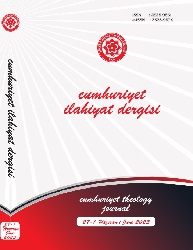Modern Tıbbın Işığında İslam Hukuku’nda Düşük Çocuğa Yönelik Hükümler
Low Child in Islamic Law in the Light of Modern Medicine Provisions Regarding
Author(s): Ömer Faruk AtanSubject(s): Health and medicine and law, Contemporary Islamic Thought, Qur’anic studies
Published by: Cumhuriyet Üniversitesi İlahyat Fakültesi
Keywords: Islamic Law; Fetus; Siqt; Abortion; Ghurrah; Puerperium; Iddah;
Summary/Abstract: The development process of the fetus in the womb has been the subject of verses and hadiths and general information has been given. Faqihs made ijtihad based on this information and the experiences of the period. Using these verses and hadiths, various provisions have been made on fetal development, living or stillbirth, and intervention to the fetus. The determination of these provisions was evaluated by looking at where and how the fetal process started. It has been determined that there is an alliance on some issues, and there are intradenomination and non-denominational conflicts on some issues. In terms of personal law, the competence aspect of the fetus has been examined and it has been determined whether it has an identity that creates rights and obligations. Accordingly, it has been ruled that although the fetus does not have the capacity to act, it has an imperfect body capacity. Faqihs agreed that in the event that the fetus dies after birth, the duties and rights that fall upon him and others are no different from those of adults. However, different opinions have been put forward considering whether the birth is complete or not and the spirit blowing depending on the duration of pregnancy. The majority of the scholars based their opinions on the hadith about the development process of the fetus, which was mentioned in three separate periods of forty days. In this article, it is observed that this did not coincide with the medical data. The comments about this process were made by taking into account the aforementioned hadith and the experiences of the period. Because it has been determined that the development period expressed by the faqihs is shorter in modern medicine. Interpretations regarding this process are not limited to hadiths, but are made by taking into account the experiential knowledge of the period. Because, contrary to the development process expressed by jurists, it has been determined that this process takes a shorter time compared to modern medicine. In another narration taken as a reference on the subject, the information that a part of fetal development is completed in forty-two days shows parallelism with medical findings. Most of the faqihs took the first hadith as a basis and counted the birth of the fetus at the end of one hundred and twenty days as a full birth. Considering the signs that he was alive, they accepted this has a right to be born when he completed one hundred and twenty days. If the duration of pregnancy is less, they have accepted that there is no such right. Since the faqihs were based on one hundred and twenty days, no law was applied to the fetus born before that, and evaluations were made according to the vitality of those born after that. In fiqh, the name of the child who dies during full birth is given the name siqt (stillborn baby) and different jurisprudence has been made in terms of branches based on four months according to the people. Disputes arising from different criteria, both non-denominational and jurists from the same sect, also disagreed on the same issue. It has been seen that the preferences in the opinion that is the basis of the fatwa vary, since the jurist took the criterion on a certain issue, not taking into account the other issues related to it, and took a different approach. These conflicts have affected the provisions such as washing, shrouding, funeral prayer and burial of the miscarried child. Moreover, its effect on the legal status of the mother such as nifas (the time required for the uterus and reproductive organs to return to normal after delivery), talaq (dissolution of marriage according to the rules of Islam) and ummu’l-waled (concubine who gave birth to a child by her owner), criminal law such as abortion and ghurrah (compensation due to abortion of the child in the womb), financial situations such as heir and inheritance and conditional contracts. has given rise to many such conclusions. In our study, in the light of medical knowledge, the death of the fetus depending on its development in the mother’s womb, the duties against it in terms of fiqh and the provisions it has brought about it will be discussed. In particular, some evaluations will be made by comparing the provisions of the Islamic Law on abortion and ghurrah with the Turkish Penal Code.
Journal: Cumhuriyet İlahiyat Dergisi
- Issue Year: 27/2023
- Issue No: 1
- Page Range: 184-195
- Page Count: 12
- Language: Turkish

